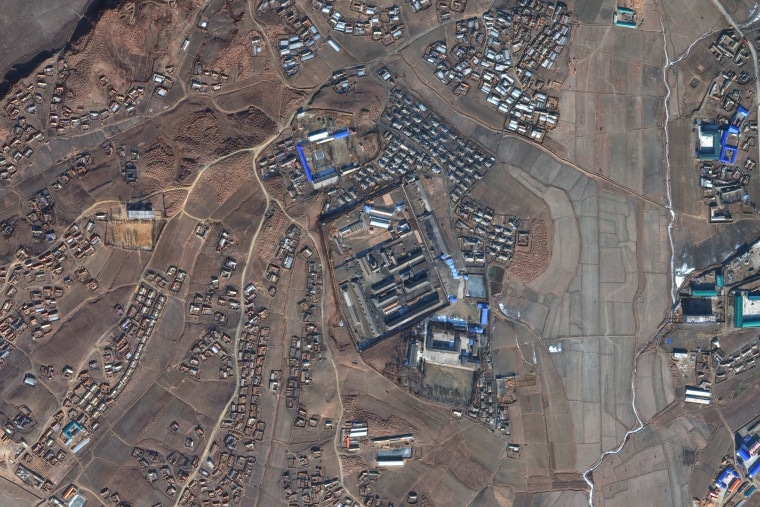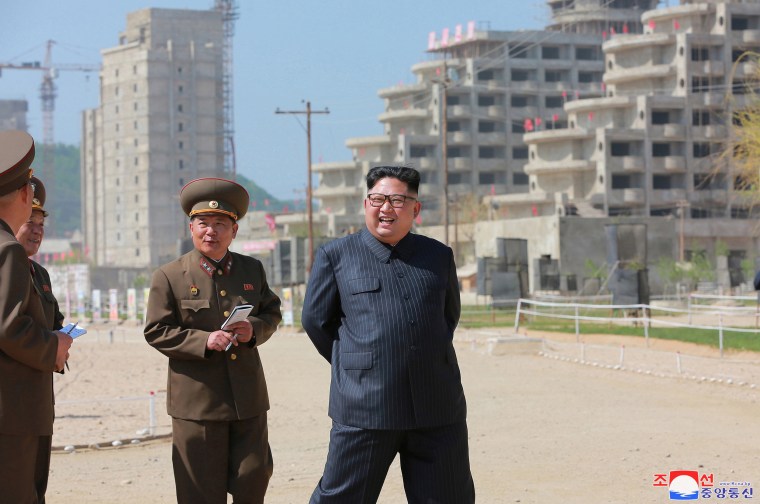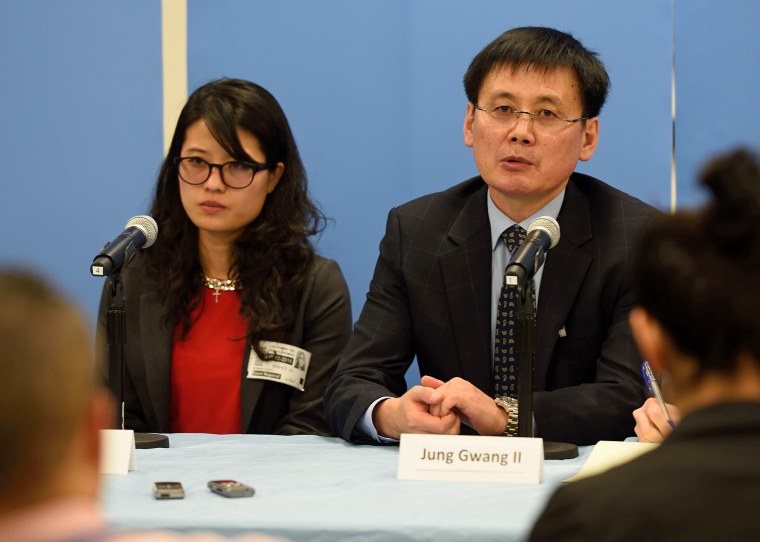WASHINGTON — Wounded from torture and starving, Grace Jo's father died on a train heading to a North Korean prison camp, a fellow inmate told his family. His crime: illegally possessing a bag of rice during the 1990s famine.
Jo escaped across the river to China in 1998, and is now a U.S. citizen and college student in suburban Washington. She is deeply concerned that President Donald Trump is preparing to make peace with the "monster," as she put it, who runs her native country.
"He should not make a deal with terrorists," Jo told NBC News. "This regime will never give up its nuclear development."
When Trump meets Kim Jong Un in Singapore on Tuesday, he will be sitting down with the leader of one of the most brutal and repressive regimes in modern history — a country that has committed "unspeakable atrocities" on a vast scale in a manner reminiscent of Nazi Germany, according to a 2014 United Nations investigation.
But two administration officials tell NBC News the U.S. has decided not to bring up human rights at the summit. And Trump has made clear he would be willing to offer security guarantees and financial aid to Kim if he gives up his nuclear arsenal.
"This would be with Kim Jong Un something where ... he'd be running his country," Trump said last month. "If we make a deal, I think Kim Jong Un is going to be very, very happy."
Trump put it more starkly than his predecessors, but he is following decades of U.S. policy that has prioritized addressing North Korea's nuclear threat over holding the regime accountable for the murder, torture, rape and starvation it has perpetrated against its own citizens.
Two former Obama administration officials, who did not want to speak publicly about the matter, said that is appropriate, although they said Trump should seek human rights concessions after a nuclear deal is consummated.
But the experts and activists who focus on human rights in North Korea call that phased approach a big mistake, for strategic as well as moral reasons.
On a practical level, they argue, verification of any nuclear deal would rely on international inspections. With that in mind, they say, the U.S. and its allies will never be able to substantiate North Korean claims to have given up its nuclear weapons; under a totalitarian regime like Kim Jong Un's, anyone who might talk to international nuclear inspectors can be dragged off to prison camps.

"As long as you have a society where every scientist, engineer and soldier lives in fear of him and his family being sent to Camp 16, we are never going to get straight answers," said Joshua Stanton, a retired Army officer whose web site, OneFreeKorea.com, chronicles North Korea's prison camps.
Camp 16, also known as Hwason Camp, is a concentration camp very close to the Punggye-ri nuclear test site that holds political detainees who have no chance of being released. They are subjected to forced labor and torture, according to international investigations.
In 1994, North Korea agreed with the Clinton administration to freeze its nuclear program in exchange for the lifting of sanctions and full normalization of relations with the U.S. But North Korea cheated on the agreement by secretly enriching uranium, undetected by international inspectors. Now, U.S. intelligence analysts believe the regime has 20 to 60 nuclear weapons, and is close to perfecting a long-range nuclear armed missile that could hit the U.S. mainland.
"You can't really have a verifiable nuclear deal with an authoritarian closed government," said John Sifton, a researcher with Human Rights Watch. "You have to have some transparency, otherwise you won't be able to verify."
Ironically, opponents of the Iran nuclear deal forged by President Barack Obama — and abandoned by Trump this year — made similar arguments. But experts point out that while Iran's theocracy is deeply repressive, it allows a level of political and economic freedom that is orders of magnitude different from North Korea. And the CIA said the verification of the Iran deal had been working.
In North Korea, "the vast political and security apparatus strategically uses surveillance, coercion, fear and punishment to preclude the expression of any dissent," a 2014 report by the U.N. Human Rights Commission found. "Public executions and enforced disappearance to political prison camps serve as the ultimate means to terrorize the population into submission."
Michael Kirby, the Australian diplomat who led the U.N. investigation, said North Korea's crimes are "strikingly similar" to those of the Nazis during World War II. Future generations, he said, will wonder why the international community failed to take action to stop them.
That is the basis of the moral argument human rights activists make about a North Korean nuclear deal that sidesteps human rights.
"How can we guarantee the existence of a regime that is committing crimes against humanity and holding 120,000 men, women and children in prison camps?" asked Greg Scarlatoiu, executive director of the Committee for Human Rights in North Korea.

Trump himself is well aware of this record. He spoke about it in detail in a speech to the South Korean Parliament in November, and he hosted six North Korean defectors in the Oval Office in February, a meeting arranged by Scarlatoiu.
"An estimated 100,000 North Koreans suffer in gulags, toiling in forced labor and enduring torture, starvation, rape and murder on a constant basis," Trump said in the speech. "In one known instance, a 9-year-old boy was imprisoned for 10 years because his grandfather was accused of treason. In another, a student was beaten in school for forgetting a single detail about the life of Kim Jong Un."
Trump added: "All responsible nations must join forces to isolate the brutal regime of North Korea — to deny it and any form — any form of it. You cannot support, you cannot supply, you cannot accept."
Hyeonseo Lee, a defector who was at the Oval Office meeting, told Trump that she "really wanted to shout with joy because I was so moved."
Now, Trump is speaking much differently as he entertains the possibility of a nuclear deal, despite a CIA assessment revealed by NBC News that North Korea has no intention of giving up its nuclear weapons capability.
Human rights activists say the U.S. has to press for concessions on human rights as part of the nuclear negotiations, because the only way North Korea will denuclearize is if the character of the regime also changes.
"The North Koreans have no interest in denuclearization," Sifton said. "The best shot we would ever have at denuclearization is if we have broader negotiations, which leads to more openness, which leads to reform or collapse of the regime. You may as well negotiate for things you can get, like scrapping their ICBMs and opening up to the U.N., and hope that leads to changes."
Human Rights Watch was one of 300 organizations that sent a letter to Kim Jong Un this week urging him to improve his country's human rights situation.
While Trump appears to have decided not to demand human rights concessions, he may not have the last word. Under a law passed in 2016 with the backing of key Republicans, Congress imposed mandatory sanctions on North Korea, and required that any significant permanent change to those sanctions be approved by Congress.
"Congress needs to be involved in this," said Sen. Ben Cardin, D-Md., during a Foreign Relations Committee hearing Tuesday. "We might have to act, because our sanctions regime is mandatory."
Some scholars have argued that such requirements are an unconstitutional infringement on a president's right to conduct foreign affairs and might not survive a court challenge.
There also appears to be language in the law that allows a president to waive the requirements for national security reasons, although that is contested.
However, some Republicans say they have been told that the Trump administration would submit a North Korean deal to the Senate for approval as a treaty.
"The president, the vice president and the secretary of state have all told me separately that their intent is to put together a treaty that will be submitted to the United States Senate under the Constitution for certification," Sen. James Risch of Idaho said Tuesday.
Risch contrasted what he said would be the Trump approach with the Obama administration's decision to forge an Iran deal without Congress.
"They know that the Constitution requires them to not only get consent but to get advice," he said.
Jo, who escaped from North Korea while still mourning her father's death, hopes that the U.S. will not forget about the 25 million North Koreans who live in what she calls a virtual prison.
"This is not the time," she said, "for the U.S. government to stop the pressure."
